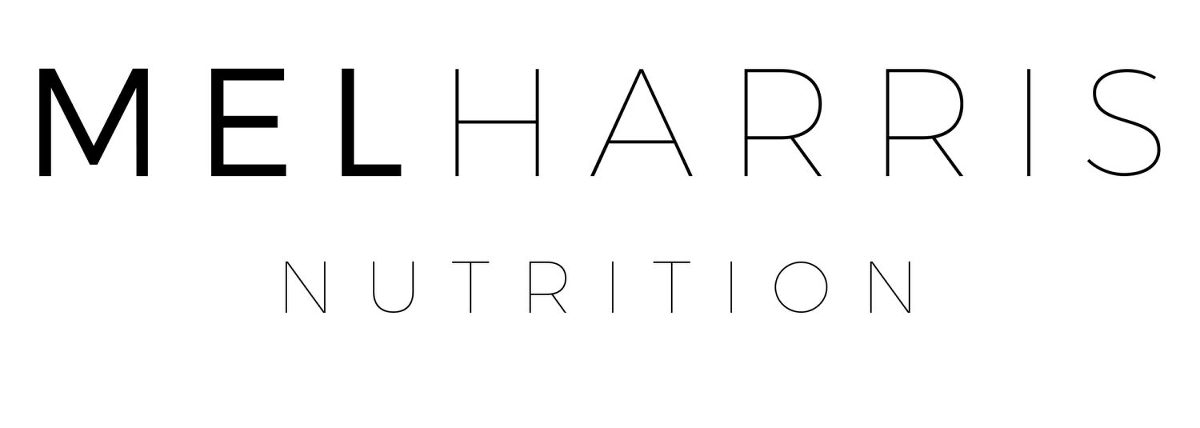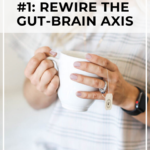The Gut-Brain Connection

You’ve heard about how everything in our bodies is interconnected. Today I’m going to tell you that your happiness could actually be improved by having a healthier gut-brain connection.
Ok, hear me out on this one…
Research is telling us more about the gut-brain connection because your gut literally sends signals to your brain on a regular basis. It’s the thing that gives you “butterflies” when you’re nervous, and helps you follow your “gut instincts.”
“Gut health” is a trendy topic, but there’s also increasing research about the bacteria that live in your gut + body and what it does. The average person has up to 5 pounds of bacteria in their digestive system (outnumbering human cells in your body), and the microbes help direct the flow of gut-brain communication.
Weird to think we’re actually more microbial than human, right?
The link connects your brain’s emotional and mental centers to your digestive system and intestinal functions. The result? How you feel (overall health), mental state (mood), and digestion.
Digestion’s role in how you feel (not just in your gut)
The main role of the gut-brain communication is food digestion. From swallowing food to enzymes that break food down, to blood flow that helps you absorb nutrients and getting rid of waste – it’s all part of the link.
The communication is designed to help you realize when you’re getting full (if you’re listening to it). It also impacts hunger hormones and inflammation. If this communication falls out of whack, it leads to dysregulation and dysfunction — most often resulting in Irritable Bowel Syndrome (IBS).
What else does our gut do?
The food we eat affects the diversity of our gut bacteria. This starts when we’re newborns, first beginning to digest breast milk or formula. It continues to affect us throughout life. Bacteria helps our gut digest fiber, which is important for our body. It also controls how our immune system works, with the gut-brain connection controlling how we respond to infections. The newest research is showing the connection within the central nervous system, which controls your brain’s functions.
Imbalance in the gut may contribute to…
- Weight gain
- High blood sugar (risk for diabetes)
- High cholesterol
- Mood shifts
- Heart disease
- Risk of cancer
Gut issues may start sending the wrong messages to your central nervous system, but this street goes both ways. On the flip side, your gut issues might be a result of anxiety, stress, depression, etc.
Think of a time in your life when you felt… nervous, anxious, angry, elated, excited, or felt yourself falling in love. Was it so powerful you could feel it in the pit of your stomach? Did your appetite change? Were your moods different?
What impacts the gut-brain connection
Your gut-brain connection is impacted by environmental, biological, and psychosocial stressors. Your gut may be impacted by stress. This can result in physical and behavioral symptoms like heartburn, stomach cramps, loose stool, headaches, teeth-grinding, procrastination, starting up or increasing smoking or drinking, and lots of other unpleasant things that do NOT make you feel better.
And it’s important to note that everyone’s gut is different.
There have been lots of studies and research into the brain and the gut’s make-up, particularly in people with autism. Nearly 75% of autistic people have gut abnormalities like digestive issues, food allergies or gluten sensitivities. Autistic people’s microbiome differs significantly from the rest of us. Studies in mice are showing how changing the gut health may change behaviors. (Read more here.)
Foods that support a healthy gut
Naturally, a healthy lifestyle includes a healthy diet — and a healthy gut will be a happy result!
Eating a diverse range of foods can help give you a healthier gut.
There are also certain foods known to aid in a healthier digestive system. Try incorporating a couple of these into your diet each week, and see how it makes you feel! Add or subtract as you learn what works best for your body.
- Omega-3 fats – find this in oily fish (like salmon), it’ll increase the good bacteria in your gut and (bonus!) reduce the risk of brain disorders.
- Fermented foods – sauerkraut is known to help get things moving for a reason; yogurt, kefir, and cheese also contain healthy microbes for your gut.
- High-fiber foods – increased whole grains, nuts, seeds, fruits, and veggies all contain prebiotic fibers that reduce stress and are good for gut bacteria.
- Polyphenol-rich foods – cocoa, green tea, olive oil, red wine, and coffee are all polyphenols (plant chemicals) that increase healthy bacteria.
- Tryptophan-rich foods – turkey, eggs, and cheese are high in this amino acid that converts into serotonin in your body.
On the flip side, try to limit artificial sweeteners. They have been shown to increase blood sugar by stimulating the growth of unhealthy bacteria. Certain antibiotics can also kill the bad AND good bacteria in your body. Prolonged need for medication may impact your gut health and require you to do a reset on your gut health.
If you can improve your body’s systems through a healthier lifestyle, you can improve your gut health. That could mean changing your diet, or changing your stress (say, meditating to decrease anxiety). Talk to your doctor if you feel your gut health is directly related to stress in your life, and talk to an RDN if you think your diet may be something you can change to help with a healthier gut!
Resources:
The Gut-Brain Connection: How it Works and The Role of Nutrition. Healthline. Accessed 8/1/19 from: https://www.healthline.com/nutrition/gut-brain-connection.
Why the Gut Microbiome Is Crucial for Your Health. Healthline. Accessed 8/1/19 from: https://www.healthline.com/nutrition/gut-microbiome-and-health.
The gut-brain connection. Healthbeat by Harvard Medical School. Accessed 8/1/19 from: https://www.health.harvard.edu/diseases-and-conditions/the-gut-brain-connection.
Great Guide that breaks down some good basics: https://gallery.mailchimp.com/8cf5df5dd2e08710c1f74ca9a/files/a1f12973-9f6a-44ad-ac7d-0c63275f40bf/Nutrition_Stripped_Guide_to_a_Healthy_Gut.pdf















